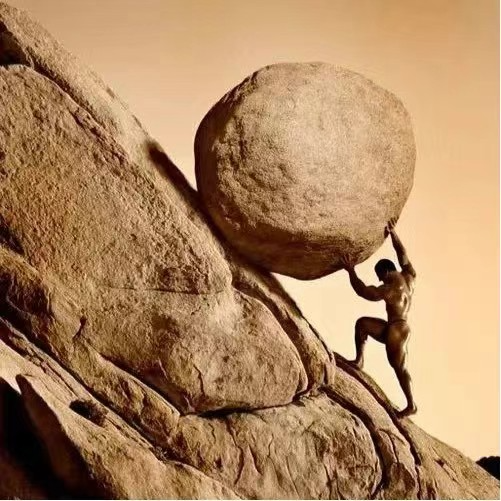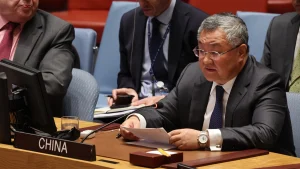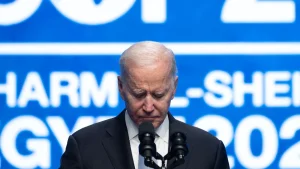US Scapegoats China to Cover its Incompetence against Russia
On June 5th, the Hudson Institute, an influential American think tank, published an article on Ukraine titled “The Strategic Contest in Ukraine – A Pivotal War Foreshadowing a Major US-China Conflict.” The Hudson Institute is a renowned think tank in the United States with a China Center dedicated to studying China. Its founding mission is to promote bipartisan-supported policy recommendations and research. During the Trump administration, US Secretary of State Mike Pompeo and his Chinese American advisor Miles Yu were both fellows at this institute.
I put several quotes here:

 Quotes of The Strategic Contest in Ukraine – A Pivotal War Foreshadowing a Major US-China Conflict | Source: Hudson Institute
Quotes of The Strategic Contest in Ukraine – A Pivotal War Foreshadowing a Major US-China Conflict | Source: Hudson Institute
In September 2023, the US’s National Defense magazine published the records of its interview with Jens Stoltenberg, NATO secretary general. I quoted some of his words here.
 Quotes of Stoltenberg’s words | Source: National Defense
Quotes of Stoltenberg’s words | Source: National Defense
Trump’s primary challenger within the Republican Party, former ambassador and governor Nikki Haley, stated that

Nikki Haley’s statements in an online interview | Source: Nikki Haley’s YouTube channel
On January 2023, the Ex-NATO Chief also had words like:
 Ex-NATO Chief’s words | Source: Newsweek
Ex-NATO Chief’s words | Source: Newsweek
There are many similar statements, so I won’t list them all. Since so many people in American political and academic circles already believe that China and Russia are in the same camp with deeply intertwined interests, why do the US and NATO still repeatedly urge or even threaten China to join them in supporting Ukraine and sanctioning Russia?
Normally, if someone wants help, they need to offer some benefits in exchange. If not benefits, at least they should ask nicely.
If the US and NATO hope that China will support Ukraine and help them counter Russia, they should at least offer some benefits. The US and Europe have many cards to play. For example, they could lift sanctions on Huawei or allow ASML to sell dozens of EUV machines to China.
But in fact, the US and Europe want China to sacrifice its own interests and turn against Russia, yet they offer nothing in return, not even the smallest concession. The US now wants China to sanction Russia, while simultaneously increasing sanctions on China and adding more Chinese companies to the entity list.
A and B are fighting. A wants C to help him beat up B. Then A tells C, “Help me defeat B, and once I defeat B, I’ll be able to focus on beating you up.”
A and B are fighting. A wants C to help him beat up B, and meanwhile, A occasionally punches and kicks C.
In this situation, how stupid would C have to be to help A beat up B? And how foolish would A have to be to think that C would help him beat up B?
From this perspective, it’s clear that the United States has no intention of persuading China to sanction Russia. If the US genuinely wanted to win China over, it wouldn’t adopt this attitude or frequently make statements like “once Russia is defeated, China will be next.”
The Russia-Ukraine war has reached a stalemate, and the economic sanctions imposed by the West have not achieved their goals. Who is to blame for this? Rather than trying to win China over, US politicians are more likely trying to blame on China, claiming that the failure of sanctions is due to China’s support for Russia. According to them, it is because China provides Russia with various technologies and industrial products that the US has not achieved its objectives.
My current stance is that I neither want Putin to fall nor do I want him to achieve a complete victory. The United States wants Putin to fall but also fears that a more hardline leader might come to power, or that Russia could descend into chaos, with atomic bombs flying around. So every time Biden talks about regime change, the State Department has to make up for him and explains that the US does not intend to instigate a coup in Russia.
Even if China were truly to be won over by the US and Russia’s economy collapsed, Russia might not necessarily compromise. It could start throwing around atomic bombs instead.
Recently, General Xu Hui [1] was criticized online as a traitor like Wang Jingwei [2], for saying at the Shangri-La Dialogue, “Ukrainians need to rethink what they are fighting for.” General Xu is not Ukrainian, so he can’t be compared to Wang Jingwei. At most, he could be compared to Roosevelt and Hull in 1941. On November 24, 1941, Hull informed the Chinese ambassador of a temporary compromise that sold out China’s interests, which infuriated Chiang Kai-shek, de facto ruler of China at that time. He then cursed them in his diary. General Xu did not urge Ukraine to surrender, and the Chinese government has not recognized Crimea or the four eastern Ukrainian regions as part of Russia. How can General Xu be considered a traitor like Wang Jingwei? In contrast, some people, without receiving any exchange conditions or benefits, advocate for China to abandon its own interests and unconditionally agree to the demands of the US and Europe. I think these people are more like Wang Jingwei.
In May 2024, another renowned American think tank CSIS published an article and stated the ultimate goals of Ukraine, which should be the basis of any American strategy.
 Ukraine’s ultimate goals | Source:CSIS
Ukraine’s ultimate goals | Source:CSIS
Obviously, to achieve these goals, the current Russian regime would have to fall. This is very difficult—harder than driving the Russian army out of Ukraine. If they can’t accomplish it, they can just shift the blame to China.
Only the United Nations Security Council has the authority to determine whether an act constitutes aggression, and Russia has veto power there. Why is this the case? What exactly counts as aggression?
Regardless of how many reasons Russia may present, it undeniably invaded an independent sovereign country, violating the sovereignty and territorial integrity of that nation. Of course, if we talk about the number of times a sovereign country has been invaded and its sovereignty violated, after World War II, the United States would rank first, and the Soviet Union plus Russia would be second.
But does invading a sovereign country constitute aggression? What counts as aggression has always been a contentious issue in the international community.
It wasn’t until December 1974 that the UN General Assembly finally adopted Resolution 3314, which provided a definition of “aggression” with seven articles in total. According to these seven articles, Russia’s actions fit this definition.
However, Russia’s actions fitting the definition of aggression in the resolution does not mean they are defined as aggression by the United Nations. For example, if someone appears to have committed murder, or a camera captures what appears to be a murder, it does not legally mean the person committed murder. Whether a person legally committed murder requires a court judgment. Recordings, videos, and witness testimonies are merely evidence for the court’s judgment. Ultimately, whether a murder was legally committed is determined by the court.
So, who acts as the court to determine whether a country’s actions constitute aggression? The UN Charter and Resolution 3314 clearly stipulate that this responsibility lies with the UN Security Council.
According to Resolution 3314, even if there is clear evidence of an act of aggression by a country, the UN Security Council can determine that no aggression has occurred. Conversely, even if none of the acts listed in Article 3 have occurred, the Security Council can still determine that other acts constitute aggression as defined by the UN Charter.
If the Security Council says an act is aggression, then it is aggression. If it says it is not, then it is not. Given this, what is the purpose of having those seven definitions? Moreover, each of the five permanent members of the Security Council has veto power.
In 1983, when the UN Security Council voted on whether the US invasion of Grenada constituted aggression, China, the Soviet Union, France, and 11 others voted in favor, while the UK and 3 others abstained, and the US vetoed the resolution. Even the UK’s closest ally, the United Kingdom, abstained. Similarly, when the Security Council condemned Russia’s invasion of Ukraine, there were 11 votes in favor, 3 abstentions (China, India, and the UAE), and 1 veto from Russia.
The actions of any permanent member, no matter how excessive, can never be legally defined as aggression as long as that member casts a veto.
Sometimes people jokingly refer to the five permanent members of the Security Council as the “Big Five Bullies.” This description is quite fitting. Even if every other country in the world stands on the opposing side, any one of the permanent members can still veto any resolution that goes against its interests. Why do the permanent members have veto power? Because the veto power is a result of war, established to protect the interests of the main victors of World War II. Only another world war could overturn this situation.
Some might ask, if there were no veto power, would it be possible to restrain the actions of the permanent members? The answer is no. It is precisely because of the veto power, and that only five countries possess it, that the United Nations has been able to sustain itself until now. International organizations inherently have no real power to restrain the actions of major powers. Even if Russia didn’t have veto power and the Security Council passed a resolution condemning Russia, would it make any difference?
Link to original article: https://mp.weixin.qq.com/s/Yp4xOmVq2mrrfZKnUv7bwQ
[1] General Xu Hui is the Dean of International Defense Affairs School of National Defense University, PLA. During this year's Shangri-La Dialogue, a journalist asked him about the Ukraine issue. He responded, "Ukrainian President Zelensky needs to consider the value of Ukrainian lives and understand what they are truly fighting for. U.S. President Biden said something quite frightening: he stated that he would support Ukraine until the last Ukrainian. He didn't say the last American; he's willing to sell ammunition to Ukraine, even if only one Ukrainian is left."
[2] Wang Jingwei was once one of the leaders of China's democratic revolution. After Japan invaded China, he turned to collaborate with Japan, serving as the leader of its puppet regime in China. He was regarded as a "traitor to the nation," similar to Philippe Pétain in France.




